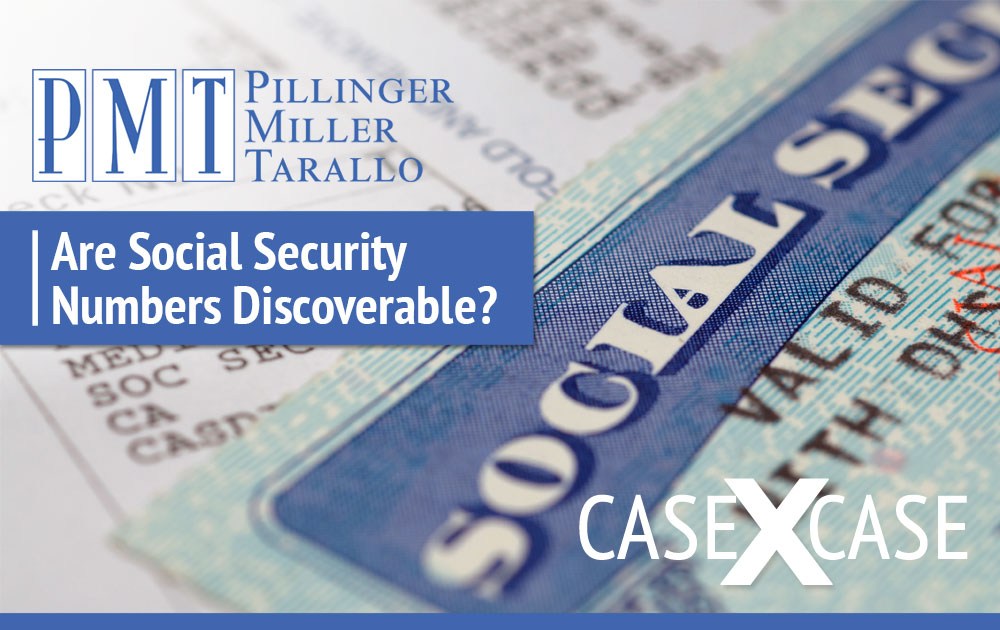
A Social Security Number is discoverable in a personal injury case because it is reasonably calculated to lead to admissible evidence. Claims of privacy and concerns for identity theft will not bar discovery of a Social Security Number. Zbigniewiwcz v. Sebzda, 58 Misc 3d 1217(A), 94 NYS3d 541 (Erie County 2018). However, the request should properly be in the form of a discovery demand, preferably attached to a demand for authorizations, and not in a Bill of Particulars. The Courts have held that a demand for a Social Security Number in a Bill of Particulars is improper as it does not serve to amplify the pleadings and, instead, it is evidentiary in nature and, thus, more properly made in a discovery demand. In Kupferberg v. State, 97 Misc. 2d 519 (Ct Cl 1978) the Court stated that the decedent’s Social Security Number was “not material to any element of the causes of action alleged, and would not serve to amplify any aspect of the pleadings. The primary usefulness of the decedent’s Social Security Number is as a tool for acquiring evidence. Since evidence itself is not the proper subject of a Bill of Particulars, a mere device for its acquisition is a fortiori inappropriately requested. Item 17 is therefore stricken.”
That being said, it is clear that a claim of privacy cannot bar the discovery of Social Security Numbers in personal injury cases where defendants are able to show that they are necessary or indispensable for defendant to obtain relevant records such as medical records, perform prior claim searches, determine liens, etc. Zbigniewiwcz v. Sebzda, 58 Misc 3d 1217(A), 94 NYS3d 541 (Erie County 2018); Pedraza v. New York City Tr. Auth., 2016 N.Y. Slip Op. 30105[U] [N.Y. Sup Ct, New York County 2016]. Defendants have been denied Social Security Numbers when “Defendants’ demand for plaintiffs’ Social Security Numbers was accompanied neither by a demand for authorizations to obtain any documents identifiable only by reference to such numbers, nor by any other showing of relevance or necessity.” Sullivan v. 40/40 Club, 34 Misc 3d 138(A) [App Term 2011]. However, when the requisite showing is made (which should be simple in a personal injury case), the number must be disclosed.
In Zbigniewiwcz v. Sebzda, supra., the court compelled disclosure stating that “Providing a Social Security Number ‘is reasonably calculated to lead to admissible evidence’ and therefore satisfies the relevance standard in CPLR 3101(a), even where plaintiff was not seeking lost earnings. A plaintiff’s Social Security Number is useful, for example in searching for his or her medical records and determining the amount of his or her Medicaid lien. Moreover, in defending the action, Defendants are entitled to conduct an investigation into any of [plaintiff’s] prior claims or injuries, medical treatment, and criminal history, which implicates the use of his Social Security Number.” Similarly, in Pedraza v. New York City Tr. Auth., 2016 N.Y. Slip Op. 30105[U] [N.Y. Sup Ct, New York County 2016] the court held that “Plaintiff was improperly directed not to answer whether he has a Social Security Number (Pedraza EBT, at 7:14-17.)
Providing a Social Security Number to defendants is reasonably calculated to lead to admissible evidence as to the issues of this action… Plaintiff’s counsel argues that plaintiff’s Social Security Number is irrelevant because he is not seeking lost earnings…However, the Social Security Number is useful, for example, in searching for plaintiff’s medical records and determining the amount of plaintiff’s Medicaid lien.” Based on the case law, a plaintiff must clearly respond to the question at a deposition. Cases such as Bibeau v. Cantiague Figure Skating Club, 294 A.D.2d 525 [2002] (a breach of contract case seeking unredacted income tax returns) and Sullivan v. 40/40 Club, 34 Misc. 3d 138(A) [App Term 2011] (defendants failed to make any showing that the Social Security Numbers were indispensable to them in order to obtain information necessary for their defense) while denying disclosure and acknowledging that Social Security Numbers constitute information of a confidential and private nature are not controlling in a typical personal injury case where defendant can easily make the requisite showing of necessity.
So the law is clear that despite plaintiffs’ attorneys claims of invasion of privacy and fears of identity theft, defendants are entitled to plaintiff’s Social Security Number in order to obtain complete medical records and Medicare lien information.
Should you have any questions, please call our office at (914) 703-6300 or contact:
Jeffrey T. Miller, Executive Partner
jmiller@pmtlawfirm.com